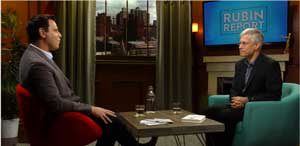Each week I present a round-up of the podcasts I listen to. These podcasts are all centered around the theme of looking at current events through the lens of Ayn Rand’s philosophy. This week, there are two shows with Yaron Brook and Leonard Peikoff answers philosophical questions. Amy Peikoff also had a podcast this week, but I simply didn’t have the time to listen. Hopefully, I will include it in next week’s round-up.
Peikoff.com Podcast – Episode 407

My 1914 Webster’s New International Dictionary
In this week’s podcast from Peikoff.com, Leonard Peikoff answers some questions, including the following:
- The accurate definition of a word is critical. What is the best dictionary? Oxford English Dictionary is the best. You can subscribe online to the OED for $295 per year http://public.oed.com/how-to-subscribe/#us
- Is it counter to Objectivism if one enjoys the mountains or even prefers to live in them, as opposed to the city? No, an objectivist is someone who acts on the principles in Ayn Rand’s writings, not the concretes illustrating them Click & Tweet! . (This reminds me of a quote from Bruce Lee in “Enter the Dragon.” “It is like a finger pointing the way to the moon. Don’t concentrate on the finger or you will miss all that heavenly glory.”)
- Do you believe everyone is an Objectivist deep down? No. It is a mistake to think that everyone wants to be happy and understand the world. Many people seek to destroy their happiness, and that of others and few are willing to take the effort required to understand the world.
- And more
Yaron’s AM560 Rewind: Not Country First. The Individual First!
In this week’s podcast version of Yaron’s live AM560 show from April 30, he picks up the thread from last week’s podcasts, namely, what is wrong with America and why do we view the world with such fear.
He starts off discussing the David Brooks editorial he also discussed in his Radical Capitalist 44 show which was recorded just before this show. Brooks is the “token Republican at the New York Times” but the views he expresses in the editorial are hardly different than those offered up by the “regressive left.” Namely, that to solve America’s problems we must give up the individualism that the country was founded on and embrace a “communitarian” collectivism. As Yaron pointed out, what is the difference between David Brooks saying we need a community and Hillary saying it takes a village?
Yaron explains that the United States was founded on the principle of individualism, and it was this principle that made us unique. Click & Tweet! The understanding that the individual must live for himself, that he must be responsible for himself. Each of us has the responsibility to make the best life for himself that is possible. To achieve such a life you must study, evaluate, judge, work and above all, think, meaning use your reason to fullest extent you can.
He goes on to explain what happens when you refuse to use reason, or, as is the case today, you are taught that reason is useless. When you do not rely on reason, all that is left is emotion, what feels right. Relying on emotion leads to failure, a failure you cannot explain, and when that happens, you look for someone to blame. If you are a Bernie follower, you blame the rich, if you are a Trump follower, you blame immigrants or foreigners. In both cases, you rarely will even consider that the fault may lay with your choices.
He had two interesting calls during the show. One pointed out that the Constitution says, “We the people,” not “I, I, I, me, me, me,” which led to an interesting discussion of the Declaration of Independence and the Constitution. The second caller pointed out that “people do not understand liberty and fear freedom.”
He ends the show with a call to action. We are not going to change America unless we change ourselves.
Click & Tweet!
We must all think and plan. Take control over our lives. For a stronger understanding of these ideas, he recommends reading Ayn Rand, especially: Atlas Shrugged, The Virtue of Selfishness and Capitalism: The Unknown Ideal.
Radical Capitalist Episode 45
In the May 7 episode of Yaron’s weekly podcast, he started off with a very brief discussion on the fact that Donald Trump was now the presumptive nominee for the Republican party, something that no one thought was possible a year ago. He ends the show with a bit more discussion about Trump
Yaron talked at length about his interview with Dave Rubin, which he enjoyed very much, and which has had a great response judging from the number of views, the first segment has had nearly 30000 views, and the full interview has 17000+, and the quality of the comments to the videos. In some cases, people posted comments that expressed the idea, “I never thought of it that way, I need to do some more thinking on this issue.” He chalks this up to the quality of Rubin’s 200000+subscribers who are relatively young, secular, pro-science and fundamentally pro-reason.
The bulk of the show dealt with discussing why smart people are ignorant about economics and what leads them to fight rational arguments in economics. For the former, he believes people reject the idea of thinking in principles, something that any complex field needs to integrate the vast amounts of information. It is the principles that allow you to see effects beyond the superficial, immediate ones. For example, when people argue for the minimum wage they often stop at the idea that some people will have larger paychecks. They give no thought to the idea that there may be fewer workers receiving those paychecks, the workers that do may end up with fewer hours and prices for goods are likely to rise as a result of the higher costs. This failure to see the non-obvious is something the French economist Bastiat referred to as the “broken window fallacy.”
Even when people can see the negative deeper consequences, they will reject them for moral reasons. They will reject principles such as artificial raising the price of something, including low-skill labor, will reduce demand for it (i.e. reduce employment), out of a misplaced notion of “fairness.” This view was seen clearly when California’s Governor Jerry Brown signed legislation increasing the minimum wage to $15 over a period of years even though it made no economic sense.
Yaron had a great discussion, related to the fairness issue mentioned above, about the effects of statism. About how statism is a system of winners and losers, and the fight is over who will be the winner and who will be the loser. Who do you value more, the worker who keeps his job when you raise the minimum wage to $15 or the worker who will lose his job for the same reason? The endless stream of tradeoffs is why central planning always fails. Click & Tweet!
Yaron took calls about inherited wealth, charity, and tariffs as the answer to the lack of protection of intellectual property by nations like China.


